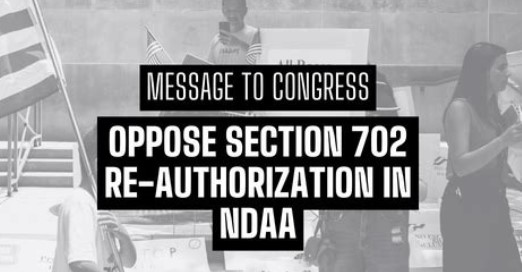Section 702: What Do We Do?

A key provision of the law governing foreign-intelligence collection is up for reauthorization, and the stakes are high. In fact, there are people serving in our Government today for whom there could be real legal consequences for the next General Election. Here is the gist:
“Section 702 extensively protects the privacy of Americans who are incidentally monitored in surveillance operations directly targeting foreigners.”
We think there is another way to express it: “If you are talking to someone overseas who does not have constitutional protections, neither do you.”
It is about time to get back to old business. It was not the last time we recall looking down at a manila folder filled with a stapled packet of papers and letting loose a deep sigh of apprehension.
The last time we did something like this was while we were still in Government with our old pal Admiral Mac Showers. We would just invite you to shamble over to the book case and pull down a copy of the book we worked on with Mac. It was called “Cocktails with the Admiral” and covered some of the elements of his remarkable career.
We could veer off into some of the elements of his time in uniform. That includes dramatic World War Two service and some of the curious parts that followed establishment of the New World Order and some of the curious events that went along with the Cold War against the Soviets.
It feels appropriate this morning, since the matter has come around to be “new” again. We are talking about some of the events that followed the assassination of a sitting President- Mr. JFK- and a long campaign to eliminate some of his successors. This has been a public policy issue for six decades. We will not drag you through that struggle this morning. In brief
summary, the struggle over our basic founding documents and old discussions on The Hill need a quick renewal. Some of them happened right here at Big Pink, since this is where Speaker of the House Carl Albert lived during some extraordinary times.
Considering some of the issues on the legislative table, the serial replacement of Speakers and a general suspicion of how our government actually works. We doubt anyone is actually talking about the Pike and Church Commissions these days, but the issues the members raised in those panels have returned.
Mac was in the middle of all that the last time, and the durability of some of the issues has lasted longer than the Congress than mandated them. And the men and women who managed the minutia of multiple information streams across the years. ‘Watergate’ was the crisis de jour of that time, and was a frequent topic of discussion at Tracy O’Grady’s legendary Willow Restaurant in Arlington.
The experience of the Watergate investigation, for example, arguably led to the passage of the Ethics in Government Act, while the findings of the Church and Pike Committees led to enactment of Foreign Intelligence Surveillance Act in 1978. That piece of legislation contains the legal guidance for how our agencies are permitted to carry out the collection of Foreign intelligence in ways approved for use against our opponents on the world stage.
Like this one, it was a crazy time in DC. The reverberations of 9/11 defined what we were doing to simulate constructive work each day. Part of the motivation behind all our activity was to ensure that constitutional rights were protected and the Government knew their limitations on what was permitted to be done to American citizens by the government that theoretically works for them.
We remember when those bodies were in action, since the collection of foreign intelligence is crucial to protecting our national security and vital global interests. Here is the deal: some of the Watergate activities were regulated by the Ethics Act. The war on terror required more lenient treatment of how our three-letter agencies collect information on our global opponents.
That would be a law- a statute- popularly known as “Section 702.” The part of that law with which our office dealt was provision enacted in 2008 with the swirl and cacophony of dramatic action against terror. It incorporated amendments to the 1978 Foreign Intelligence Surveillance Act (FISA). Mac was the action officer for the Director of Central Intelligence on creating it, and the challenges to our liberty contained in the Global War on Terror (GWOT).
Our Boss, the legendary and lovely Joan Dempsey was charged with a review to ensure that nothing inappropriate was contained in the dizzying number of paragraphs in the refurbished legislation. When I completed a cursory review, I finished emitting my sigh and appended my initials to the review box in the upper right corner of page one and thought that if any of those powers were harnessed by the government to sift the digits we all use to get through the day.
Here is what Section 702 actually accomplished was to transfer oversight of the Executive Branch’s core political functions to the Judicial Branch. That used to be part of the Constitutional Amendment process, but it is much easier this way. We have argued periodically that our government has been changing itself, with the Executive Branch outsourcing its responsibility to the folks in Legislation who have, in turn, relinquished that oversight to the branch of government least well-equipped, institutionally and practically, to perform that role. Hello, Congress!
There are arguments that Section 702 was ill-conceived at inception. Should Congress fail to reauthorize the provision THIS MONTH by allowing it to lapse at the, or to supplant Section 702 with something even more ill-conceived and unworkable, will be a potentially catastrophic blunder.
The list of problems with Section 702 are enough for two or three reinforcement opinion pieces for morning consumption. This morning, the public servant responsible for moving deck-chairs around is Senator Dick Durban from Illinois.
It would be fun to sit down with the Senator and look at some of the issues on his plate this morning. They are enough to merit numbers:
(1) Examine the misconceptions that undergird our system of foreign counterintelligence, since Washington will not address them…
(2) Define what Section 702 does and why it is controversial…
(3) Assess allegations that Section 702 greenlights spying on Americans…
We think the Senator would assure us this morning that abuses of power — like every violation of law- will occasionally occur due to complexity and confusion in the system. Are there FISA issues in Section 702?
We prefer unamiguity, particularly with Constitutional law, so “Yes.” Horowitz’s latest report revealed that the FBI included “apparent errors or inadequately supported facts” in all 29 FISA surveillance applications filed between 2014 and 2019 and reviewed as part of the audit.

(Senator Richard Durban, D-IL)
The Senator would conclude his remarks by saying something like: “In reality, Section 702 extensively protects the privacy of Americans who are incidentally monitored in surveillance operations directly targeting foreigners.” Our stab at a translation to that sentence is simpler: “Constitutional protections against government surveillance are void if you happen to be talking to a foreigner.”
Here is one of the roots of our current legislative struggles. It is easy to see, then, why the FBI, the Justice Department, and our Spooks are resistant to judicial intrusions on the collection of foreign intelligence, such as probable-cause warrants, which opponents of Section 702’s renewal would require before the FBI could access its database for information about Americans.
Since the information stored in the database was acquired only after a rigorous process that features more protection for Americans than the Constitution requires, and since the FBI’s main purpose in seeking to peruse the database is foreign intelligence, an additional warrant requirement would not merely be unnecessary, it would obstruct the executive branch’s duty to safeguard our homeland and vital national interests.
Copyright 2023 Vic Socotra
www.vicsocotra.com
